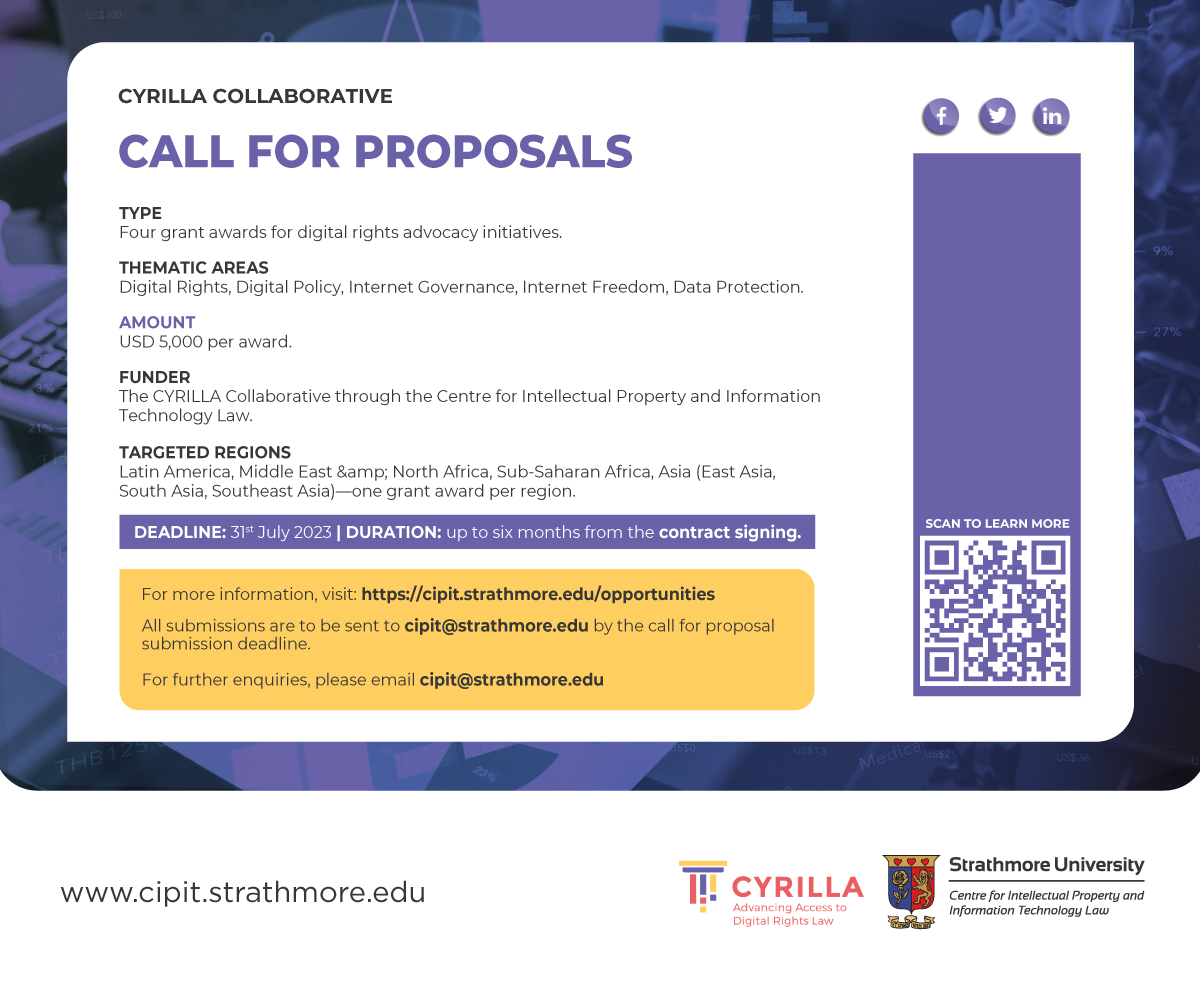Update: the deadline has been extended until August 15, 2023.
The CYRILLA Collaborative has announced a call for proposals. Through the Centre for Intellectual Property and Information Technology Law (CIPIT), the Collaborative will award four grants for digital rights and advocacy initiatives – particularly those focusing on digital rights policies with an impact on marginalized communities in Latin America, Middle East and North Africa, Sub-Saharan Africa, and Asia (East Asia, South Asia, and Southeast Asia).
OVERVIEW OF THE CYRILLA COLLABORATIVE
The CYRILLA Collaborative is a global initiative that seeks to map and analyse the evolution and impacts of legal frameworks on digital environments, particularly in the Global South.
The Cyberrights Research Initiative and Localized Legal Almanac (CYRILLA) also aims to organize and make accessible the world’s digital rights-related jurisprudence so that a wide range of actors can more readily and confidently access legal trends as they shape and impact digitally networked spaces, highlighting threats to human rights and opportunities for policy and legal reform.
To realize that mission, the CYRILLA Collaborative manages an open and federated resource toolkit and online database, to accelerate the structuring, sharing, comparison, visualization, and interoperability of legal information on digital rights. The database is built on HURIDOC’s Uwazi platform and includes legal information on digital rights from more than ninety countries provided by the organizations in the Collaborative.
The Collaborative comprises several organizations, namely Centre for Intellectual Property and Information Technology Law (CIPIT), Association for Progressive Communications (APC), Social Media Exchange (SMEX), Columbia Global Freedom of Expression (CGFoE), and Derechos Digitales (DD). Each partner works on developing their open tools on digital rights that can be adopted and adapted as needed by any individual or organization grappling with questions involving legal restrictions on digital rights.
GRANT SUMMARY & ELIGIBILITY
The Collaborative will award four grants for advocacy-oriented initiatives particularly those that aim to highlight and influence digital rights policies which impact marginalized communities in the following regions: Latin America, Middle East & North Africa, Sub-Saharan Africa, Asia (East Asia, South Asia, Southeast Asia).
The grants are limited to non-profit non-governmental organizations that demonstrate a tangible presence in the target region and active engagement in activities around digital rights policy and advocacy. Therefore, we invite digital rights organizations, human rights organizations, civil society organizations, and advocacy groups to submit proposals. The applicant organizations should be legally registered in their country of operation.
The proposals for advocacy grants will be evaluated by a committee made up of the partner organizations in the Collaborative following these selection criteria:
- The extent to which the proposals relate to the call,
- The extent to which activities and outputs in the proposal are clearly defined,
- The extent to which target audiences are defined and activities suited to such audiences,
- The extent to which the proposal is feasible given the budget and time frame, and
- The extent to which the envisaged outcomes positively impact communities identified as marginalised in the proposal.
KEY TIMELINE
| 1 June 2023 | 15 Aug 2023 | By max 31 Aug 2023 | By max 30 Sep 2023 |
| Call for proposals release | Proposal submission deadline | Proposal selection announcement | Grant agreement signing |
| The grants awarded will be for a duration of up to 6 months. | |||
APPLICATION INSTRUCTIONS
Applicants shall submit the following documents in English Language and Microsoft Word format:
- A cover letter detailing the structure of the organization, its missions, experience, and its interest in the research program outlined above.
- A proposal not more than five pages (including annexes) covering the following elements:
- Evidence of previous relevant experience,
- Intended project theme/topic and its scope,
- Project overview, describing how the proposed project fits the key requirements outlined above,
- Project methodology and structure (High-level work plan),
- Project breakdown and objectives, and
- Key project risks and proposed mitigation strategies.
3. A proposed budget up to USD 5,000.
All submissions are to be sent to cipit@strathmore.edu by the call for proposal submission deadline.
For further enquiries, please email cipit@strathmore.edu

